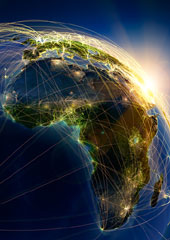How Countries Compare on Corruption
Which major emerging nation is perceived to have the most corruption in its public sector?
February 26, 2013
There is an almost continuous stream of news stories about acts of corruption committed by officials in China.
We wonder: Which of these emerging market economies is perceived to have the most corruption in its public sector?
[toggle title_open=”A. China is not correct.” title_closed=”A. China”]
In the 2012 edition of Transparency International’s Corruption Perceptions Index for 176 countries and territories around the world, China ranks 80th in terms of the perceived level of public-sector corruption. That makes it the second-best performer among the BRIC countries.
In contrast, Hong Kong, now a special administrative region of the People’s Republic, ranks 14th. That puts it essentially on par with Germany — and ahead of Japan and the United Kingdom (both sharing 17th place) and the United States (19th).
While news reports about corruption in China are ever more frequent, the Communist Party leadership realizes that if not effectively checked, official corruption — such as the 2012 scandal that resulted in the high-profile removal of Bo Xilai from his posts — will weaken support among an ever more civically engaged population.
As a result, one of the country’s newest Politburo members, Wang Qishan, has been placed in change of a prominent committee to deal with official corruption and misconduct.[/toggle]
[toggle title_open=”B. Russia is correct.” title_closed=”B. Russia”]
When Russia emerged from over seven decades of Communist rule in late 1991, there was a lot of talk about the importance of the rule of law. Almost a quarter century hence, it has remained just that — talk.
According to Transparency International, Russia ranks 133rd out of 176 countries in terms of perceived public-sector corruption — by far the worst among the BRIC countries. Russia performs only slightly better than Nigeria, Pakistan and Kenya (all sharing 139th place).
The causes of corruption include a mix of low public-sector salaries, a lack of political stability, cultural traditions and an "anything goes" mentality during economic booms. In addition, countries that have a lot of raw-material wealth, like Russia, tend to have higher levels of corruption.[/toggle]
[toggle title_open=”C. Brazil is not correct.” title_closed=”C. Brazil”]
Brazil ranks 69th in Transparency International’s index. That makes it the best performing country among the BRIC nations.
Nevertheless, Brazil is dealing with a multitude of corruption scandals, including the conviction of former President Lula’s chief of staff for bribing lawmakers. Under current President Dilma Rousseff, several cabinet members and other top-ranking staff were indicted and forced to resign as well.
Even more so than in China’s case, it has to be seen as a sign of definite progress that these cases are now dealt with in the open in the courts of law.
Brazil ranks just behind Saudi Arabia in terms of perceived corruption — and is at the same level as South Africa. However, it performs better than Italy (72nd), a G7 country where perceived corruption is about as bad as in Bulgaria.[/toggle]
[toggle title_open=”D. India is not correct.” title_closed=”D. India”]
India ranks 94th worldwide in the perceived level of public-sector corruption. That makes it second-worst among the BRIC nations — and puts it well behind China. The perception of corruption dents India’s global image as an effective democracy and limits its attractiveness for foreign investment.
India is perceived to have about the same level of corruption in its public sector as Greece — and less corruption than Argentina (102nd), Mexico (105th), the Philippines (105th) and Indonesia (118th). Indians may take small comfort in seeing their neighbor and rival, Pakistan, rank even lower.
At the bottom of the global rankings are such countries as Libya, Zimbabwe, Haiti, Venezuela, Iraq, Myanmar, Sudan and Afghanistan.[/toggle]
Editor’s note: This Globalist Quiz was produced with the research assistance of Deborah Hardoon of Transparancy International. TI’s 2012 Corruption Perceptions Index can be viewed here.
To listen to The Globalist’s Stephan Richter discuss this quiz with Marketplace Morning Report host Jeremy Hobson, click here to open a pop-up media player.
Author
The Globalist
Read previous

The Inexorable End of the Africa Story
February 25, 2013